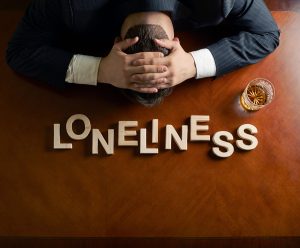We Are Not Having an Easy Life Cause Our Family and All Treat Us Like Stranger Ie
I Feel Lonely: What To Do When You're Feeling Alone
 "Why do I feel alone?"
"Why do I feel alone?"
Human beings are instinctively social animals. It is natural for us to feel alone or lonely when we are isolated from others. As a tribal species, our brains adapted to rely on social connections as a means to survive. In fact, according to neuroscientist John Cacioppo, who has made a career out of studying loneliness, "The absence of social connection triggers the same, primal alarm bells as hunger, thirst and physical pain."
Put simply, "Humans don't do well if they're alone."
However, modern life, with all of its conveniences, has led to a sharp increase in isolation. As a result, loneliness is on the rise. According to Cacioppo, "The percentage of Americans who responded that they regularly or frequently felt lonely was between 11% and 20% in the 1970s and 1980s… The American Association of Retired Persons(AARP) did a nationally representative study in 2010 and found it was closer to 40% to 45%."
When we find ourselves becoming isolated, we should take that as a warning sign that we may turning against ourselves in some basic way. The path of isolation leads to loneliness, despair, and even depression.
"I feel lonely? What's wrong with me?"
When we feel lonely, we often tend to beat ourselves up and think that something is just wrong with us. The more alone we feel, the more we start to have thoughts of not belonging or of feeling rejected by others. Left alone with our thoughts, we become our own worst enemy. An isolated space is the perfect breeding ground for negative, self-critical thoughts. These thought patterns make up the "critical inner voice (CIV)," an internalized enemy that leads toself-destructive thought processes and behaviors. This inner critic feeds into our feelings of isolation, encouraging us to avoid others and remain in a lonely state.
Although our critical inner voices may tell us otherwise, in reality, there is nothing inherently wrong with us that leads us to be lonely. It is a common misconception that people are lonely because they have poor social skills. In fact, new research shows that lonely people have perfectly adequate social skills and even out perform non-lonely individuals when it comes to reading social cues. However, when "social pressure" is introduced to social skills tests, lonely people often begin to choke. They start to feel very anxious or fear failure. In essence, their self-limiting beliefs or critical inner voices interfere with their natural social abilities.
Loneliness is not quantified by the amount of time we spend alone, but rather by how we feel about the time we spend alone. Cacioppo defines loneliness, as "perceived social isolation, or the discrepancy between what you want from your social relationships and your perception of those relationships." Feeling lonely can trigger thoughts that we are unloved or unlikeable. Your critical inner voice will come up with a nasty list of reasons that you are lonely, viciously attacking you and the people around you. For example, you may attack yourself for being "awkward" or "creepy" and then act quiet in a group of people. Subsequently, you may then attack yourself for not talking enough. These thoughts reflect a hostile and unfriendly point of view toward yourself. Treat these thoughts like they were coming from an external enemy, and do not tolerate them.
"What causes loneliness?"
There are several factors that lead individuals to feel lonely. The main causes of loneliness being:
- Heredity – According to John Cacioppo, "Loneliness is about 50% heritable, but this does not mean loneliness is determined by genes. What appears to be heritable is the intensity of pain felt when one feels socially isolated." Depending on their genes, some people are more likely to feel more pain or perceive themselves as more alone when they are out of touch from others.
- Environment– Loneliness is often triggered by one's environment. If one lives in an isolated area or has recently moved to a new location, they are more susceptible to loneliness. Furthermore, moving to a new country or studying abroad, where language or cultural barriers can complicate social interactions can also lead people to feel more alone.
- Circumstances – Painful life circumstances, such as divorce or loss, can increase feelings of loneliness.
- Thoughts & Attitudes – The way we think and feel about ourselves and the world around us can also trigger loneliness.
There are other psychological and developmental factors that can lead to feeling alone. Severely lonely individuals often report:
- History of abuse
- Hostile/intrusive or withdrawn/misattuned parents
- Disorganized or anxious ambivalent attachment style and problems with communication
- Internalization of parent/ attachment figures
- Feelings of hostility or helplessness

"Is loneliness serious?"
Although, temporary times of loneliness are common and can pass quickly, loneliness can be a chronic condition with serious, harmful effects on both one's physical and mental health. The effects of long-term loneliness on psychical health include, diminished sleep quality, weakened health, and even increased mortality. While the effects on one's mental health include depression, timidity, misremembering, and focus on exclusion rather than inclusion (which perpetuates the critical inner voice).
Studies are now showing that a lonely brain is structurally and biochemically different. The neural response to positive events and images get suppressed, so the world is perceived through a negative filter. When we are lonely, we are more likely to see things as hopeless. We may feel that the world around us is threatening or beyond our control. This makes it difficult to summon up the energy and courage to find happiness and change.


Length: 90 Minutes
Price: $15
On-Demand Webinars
In this Webinar: Learn about the psychological roots of loneliness. Overcome the critical inner voice that perpetuates feelings of isolation. Challenge the psychological…
"How can I stop feeling so alone?"
Loneliness is not a helpless condition. There are actions you can take to combat feeling alone and begin to have more meaningful, social connections in your life.
Challenge Your Inner Critic
In their research, father and daughter psychologists Drs. Robert and Lisa Firestone found that the most common negative thought people have toward themselves is that they are "different from other people." These self-limiting beliefs can keep you stuck in a cycle of loneliness. Your critical inner voices try to keep you from challenging yourself to step outside your comfort zone, then stab you in the back for avoiding taking action. When you hear these self-attacks, it is vital that you do not allow them to manipulate your behavior. Acknowledge your feelings of loneliness and isolation without judgment, saying to yourself "I feel lonely right now, but I am not going to give in to my critical inner voice and beat myself up about it." Instead, you can learn to challenge your inner critic.
Learn how to Overcome Your Inner Critic in this online course.
Practice Self-Compassion
Self-compassion is the radical act of treating yourself with the same kindness that you would treat a friend. Researcher Dr. Kristen Neff has found that self-compassion leads to "greater emotional resilience, more accurate self-concepts, [and] more caring relationship behavior." According to Dr. Neff, self-compassion involves three main elements. Let's break these elements down in relation to combatting loneliness:
Self-kindness Vs. Self-judgment – "Self-compassion entails being warm and understanding toward ourselves when we suffer, fail, or feel inadequate, rather than ignoring our pain or flagellating ourselves with self-criticism," Dr. Neff says. When we feel isolated or alone, we can choose to have compassion for ourselves. We can recognize our emotions without judging them, perhaps saying to ourselves, "I'm really hurting right now." Denying the reality of our pain only leads to more suffering and frustration. "When this reality is accepted with sympathy and kindness," says Dr. Neff, "Greater emotional equanimity is experienced." When we accept where we are at and what we are struggling against, without berating ourselves, we can then begin to change.
Mindfulness Vs. Over-identification with thoughts – According to Dr. Neff, "Self-compassion also requires taking a balanced approach to our negative emotions so that feelings are neither suppressed nor exaggerated." You can observe your negative thoughts without accepting them as truth or allowing them to dictate your actions. Mindfulness teaches us not to over-identify "with thoughts feelings , so that we are caught up and swept away by negative reactivity." If you are feeling lonely, be wary of labels; you are not "alone," a "loser," a "recluse," "bad at making friends," etc. Embrace the non-judgemental nature of mindfulness.
Common humanity Vs. Isolation– Even when you are feeling isolated from others, you can begin to recognize your common humanity. ALL humans suffer. ALL humans are wired for social connection and will feel pain when they feel emotionally isolated from others. "The very definition of being "human" means that one is mortal, vulnerable and imperfect," says Dr. Neff, "Therefore, self-compassion involves recognizing that suffering and personal inadequacy is part of the shared human experience – something that we all go through rather than being something that happens to 'me' alone." Even though you are feeling lonely, it is important to recognize that you are not alone in this pain. Just look at the comment section below. The world is full of lonely people.
Read about The Many Benefits of Self-Compassion
Take Steps to Break Free From Isolation
Come up with a plan and begin to take steps to break free from isolation. Ask yourself the following questions:
When do I feel the most alone?
When do I feel the least alone?
What activities do I most enjoy?
Is there anyone I feel good spending time with? List their names.
Now think about some concrete ways to address your answers to those questions:
How can you feel less alone at those lonely times? Can you reach out to a friend? Join an online chat community? Find a healthy way to distract yourself from the loneliness, like exercise, meditation, or even temporarily playing a distracting video game?
Why do you think you feel less alone at certain times? How can you expand on those positive times? For example, if you feel good at work, maybe you could spend more time with your coworkers or find hobbies like volunteering that build on similar skills you enjoy sharing at work.
Are the activities you enjoy social? If so, how can you participate in these activities more? If the activities are isolated, how can you connect with others who enjoy these activities? The Internet is an incredible resource for building community with people around the world who share your interests. People who use the Internet to really connect with others are less likely to feel lonely.
If there are friends, coworkers, or family members that you feel good being around, make plans to spend more time with them. Think of activities you could do together or things you could share on a more regular basis.
Because our brains do not respond positively to seclusion, place yourself in social settings, even if you are among strangers. If you feel shy in public, try going online. Interacting on the Internet may be a good first step in giving you the confidence to express yourself. Fight hard against the critical inner voices that try to talk you into isolating yourself.
Practice Generosity
One of the best actions we can take to counteract the hopelessness we may feel is to think outside of ourselves. Generosity is a natural repellant against self-hatred. Believe beyond all doubt that you have something to offer! Volunteering is a great exercise in thinking outside yourself and often gives you the opportunity to connect with new people. Even little acts of generosity can have a significant impact. Generosity, as a principle, can lead to stronger self-esteem, which then leads to more social behavior.
To learn more about where loneliness comes from and how you can combat it, watch our Webinar on A Way Out of Loneliness
If you are feeling isolated and may be experiencing symptoms of depression, here are some helpful resources:
National Institute of Mental Health – Depression
Depression.com
WebMD – Depression
Helpguide.org – Depression
Depression-Screening.org
GET HELP: IF YOU OR SOMEONE YOU KNOW IS IN CRISIS OR IN NEED OF IMMEDIATE HELP, CALL1-800-273-TALK(8255).
This is a free hotline available 24 hours a day to anyone in emotional distress or suicidal crisis.
International readers can click here for a list of helplines and crisis centers around the world.
Tags: alone, depression, isolated, isolation, loneliness, lonely, loss, sad
spaldingcabol1944.blogspot.com
Source: https://www.psychalive.org/isolation-and-loneliness/


0 Response to "We Are Not Having an Easy Life Cause Our Family and All Treat Us Like Stranger Ie"
Post a Comment